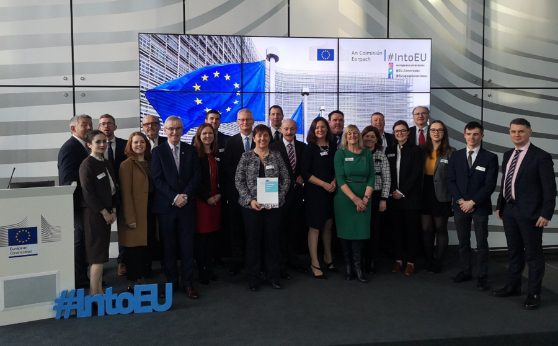The national SME and Entrepreneurship Growth Plan : what you need to know

The National SME and Entrepreneurship Growth Plan was published by An Tánaiste Leo Varadkar in January and maps out an ambitious strategic blueprint for the SME sector. Broadly welcomed by Chambers Ireland, the Growth Plan contains three sets of recommendations to assist companies to start up, scale up, enhance their digital capabilities, and increase export activity across the next 1-5 years to aid in the post-pandemic recovery. Our Policy and Research Executive Michaela Reilly breaks down the actions contained in the plan, as well as our own recommendations for it and some of the missed opportunities.
 What does the Plan set out?
What does the Plan set out?
Divided into three timeframes, the Plan sets out a broad set of policy deliverables encompassing internationalisation; productivity, digitalisation and competitiveness; networks and clustering; and entrepreneurship.
The short-term deliverables (to be achieved in less than one year) include areas such as:
- all Government departments utilising the SME Test
- an analysis of existing network and clustering programmes
- establish micro-credentials for entrepreneurs in finance, digitalisation, human resources, etc.
- the establishment of a Single SME Portal.
The Medium-term deliverables (1-3 years) make up the majority of the plan and include:
- developing tailored supports for digital exports
- exploring new ways to incentivise and de-risk the Exporter Journey for SMEs through trade missions and a State-backed export credit insurance scheme
- publication of an SME Cost Index
- embedding the ‘Think Small First’ principle, requiring SME interests to be considered at an early stage of policy formulation.
Lastly, the long-term deliverables (3+ years), are focused on:
- enabling micro and start-up enterprises to become digital exporters
- getting an additional 2,000 SMEs on the export journey
- State investment in emerging tech unicorns and removal of barriers for growth.
Chambers Ireland recommendations for the Plan
As a member of the SME Growth Taskforce, Chambers Ireland Chief Executive Ian Talbot was centrally involved in the development of the strategic vision of the plan. In addition, the Chambers Ireland policy team submitted its recommendations to the Taskforce in October.
The submission proposed a range of detailed actions to support SME competitiveness by committing to:
- balanced regional development
- the evolution of a competitive tax system that recognises innovators, investors and entrepreneurs as key contributors to growth
- internationalise the SME sector to ensure it is appropriately diversified to deal with the dual shocks from Brexit and Covid-19
- sustained and increased State investment in affordable, quality childcare to improve access to the workforce
- additional funding for education and training to support the creation of new jobs lost to the pandemic.
What we liked
The Growth Plan is an excellent blueprint for boosting the SME sector. We were very pleased to see that it commits to addressing lots of the challenges we detailed in our submission, especially in areas such as:
- expanding entrepreneur apprenticeships and internships on third-level courses to increase labour market participation and essential upskilling
- developing sectoral Export Guides, supported by relevant case studies
- examining taxation measures (e.g. rollover relief and reduced CGT) and incentive schemes aimed at increasing equity investment
- level playing field SMEs and MNCs to attract and retain staff.
What we think needs more work
- Flexible Working: Expedite and reframe the publication of a National Strategy on Flexible Working as a short-term deliverable, as opposed to the current 1-3 year timeframe that it is categorised under.
- Broadband roll-out: Similarly, the roll-out of the National Broadband Plan must be accelerated ahead of the 3+ years’ timeline it is currently categorised under, in line with the National Remote Work Strategy.
- Affordable, quality Childcare: Sustained and increased State investment in affordable, quality childcare is fundamental to improving workforce accessibility across the board. This is an area that has yet to be addressed in the Plan and urgently requires greater attention.
Useful links
- Chambers Ireland Submission to the SME Growth Taskforce
- Report of the SME Taskforce: National SME and Entrepreneurship Growth Plan
- Programme for Government – Our Shared Future
- The OECD’s ‘Roadmap for SME and Entrepreneurship Policy in Ireland’
- EU SME Strategy for a Sustainable and Digital Europe
- National Remote Work Strategy

 What does the Plan set out?
What does the Plan set out?